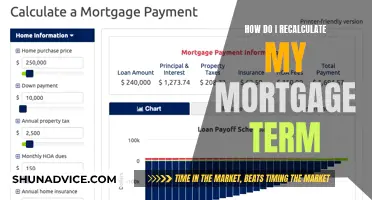
If you need to borrow more money, you can top up your mortgage by taking on more borrowing from your current mortgage lender. This is known as a further advance and is usually at a different rate to your main mortgage. You can also apply for a top-up loan from your bank, which can be consolidated with your existing loan into one monthly repayment. Before applying for additional borrowing, it's important to understand the true cost of borrowing and the consequences of not keeping up with your repayments. You could lose your home if you don't keep up with your mortgage payments.
| Characteristics | Values |
|---|---|
| What is a top-up mortgage? | A further advance or additional borrowing on your mortgage. |
| Who can get it? | Existing customers of the lender. |
| How to get it? | Apply online, by phone, or in-person at a branch. |
| How much can you borrow? | Up to 90% of the value of your home. |
| Borrowing more than £15,000 | You may face greater scrutiny by lenders. |
| LTV (Loan-to-Value) | The lower the LTV, the less risky you are to the lender. |
| Interest rates | The interest rate for a top-up mortgage is usually lower than a personal loan but could be higher than your existing loan. |
| Repayments | The longer the mortgage term, the more interest you will pay. |
| Risk | Your home may be repossessed if you do not keep up with repayments. |
| Alternative options | Credit cards, personal loans, or switching to another mortgage lender. |
| Debt consolidation | You can consolidate your existing debts into your mortgage, but this may result in paying more interest over the mortgage term. |
| Purpose | Lenders may be more comfortable with lending for home improvements than for a new car or a holiday. |
| Affordability | Lenders will assess your income, bank statements, and spending habits to determine if you can afford the mortgage. |
What You'll Learn
- Topping up your mortgage may be more expensive than other borrowing options
- Lenders will assess the risk of your borrowing requirements
- You can borrow up to 90% of your property's value
- You can choose to top up your existing loan or take out an additional loan
- You can lose your home if you don't keep up with repayments

Topping up your mortgage may be more expensive than other borrowing options
While taking out a further advance on your mortgage can be a good way to borrow a large amount of money, it may be more expensive than other borrowing options. This is because you are borrowing over a much longer period, and so you will end up paying more interest overall. For example, borrowing £5,000 at a 3% interest rate over 20 years would cost £1,630.88 in interest payments, whereas borrowing the same amount over three years at the same interest rate would cost just £231.41. Even if the interest rate were higher, at 6%, you would still only pay £463 in interest over three years.
However, it is important to consider the risks of other borrowing options. Credit cards, for example, tend to have much higher interest rates than mortgages, and personal loans may be harder to obtain. Lenders will want to be certain that you can afford to pay back the loan, so they will closely examine your bank statements and spending habits. They will also consider how risky your borrowing requirements are. Spending on a new car or a holiday may be viewed less favourably than home improvements, which should increase the value of your property.
If you are looking to borrow a large amount, you will likely need to provide evidence, such as builders' quotes and planning permission. Lenders may also release the funds in stages, rather than as a lump sum. You could also consider switching to another mortgage lender and increasing your borrowing, but this is only suitable if you can save more than you will have to pay in application fees and early repayment charges.
Before taking out a further advance on your mortgage, it is important to consider the alternatives and shop around for the best deal.
Understanding Mortgage Submission Process for Your Homestead
You may want to see also

Lenders will assess the risk of your borrowing requirements
Your employment status will also be scrutinized, with casual or seasonal employees facing additional challenges in getting their loan approved. Self-employed borrowers may also face a more complicated application process, as lenders will need to closely examine their income. Lenders will also take into account the amount you wish to borrow and what you plan to use the money for. Borrowing a large amount, such as over £15,000, or using the funds for something other than home improvements, may result in greater scrutiny by lenders.
The lower your Loan-to-Value (LTV) ratio, the less risky you will appear to lenders. This ratio represents the percentage of your home that you own versus the percentage you owe to the lender. A lower LTV indicates that you own more of your home and are therefore a less risky borrower. Additionally, a larger down payment of at least 20% can make you appear less risky to lenders and may result in better loan interest rates.
It is important to understand the true cost of borrowing and the consequences of missing repayments. Borrowing more on your mortgage can be more expensive than alternative options, such as using a credit card or taking out a personal loan, due to the longer repayment period. Lenders will assess all these factors to determine if you are likely to repay your debts or if you pose a risk of defaulting.
Minimizing Mortgage Principal: Strategies to Reduce Your Debt
You may want to see also

You can borrow up to 90% of your property's value
Borrowing more on your mortgage can be more expensive than alternatives such as using a credit card or taking out a personal loan. This is because you are borrowing over a much longer period of time with a mortgage. For example, borrowing £5,000 at a 3% interest rate over 20 years would cost you £1,630.88 in interest payments, whereas borrowing the same amount at the same interest rate over three years would cost you £231.41 in interest payments.
If you are looking to borrow a large amount (more than £15,000), you are more likely to need evidence. For example, if you are looking to make significant renovations to your home, such as an extension, you will probably need to show builders' quotes, plus planning permission. For big home improvements, the funds could be released in stages as the building progresses, rather than given to you upfront, as they might be for a kitchen refit.
Lenders will want to be certain that you can afford your mortgage before they agree to lend you the money. They will assess how much you can afford to borrow and consider how risky your borrowing requirements are. Lenders tend to view funding home improvements as lower risk, as the value of your property should increase, making it more of an investment. On the other hand, lenders may be more uncomfortable with the idea of you borrowing money to spend on a new car or a holiday.
If you are a NatWest or Nationwide customer, you can borrow up to 90% of your property's value. For Nationwide, you can use their mortgage calculator to get an idea of how much you could borrow. NatWest customers can also calculate their repayments and submit an application through their Remortgage to NatWest page.
Reaffirming Your Mortgage: A Guide to Navigating the Process
You may want to see also

You can choose to top up your existing loan or take out an additional loan
If you are looking to borrow a large amount, you may want to top up your existing loan or take out an additional loan. The latter means you will have separate loans and separate payments. However, if you choose to top up your existing loan, your existing loan will be consolidated into one monthly repayment.
If you are borrowing more on your mortgage, you will be taking on more debt, which can be far more expensive than alternatives such as using a credit card or taking out a personal loan. This is because you are borrowing over a much longer period. For example, borrowing £5,000 at a 3% interest rate over 20 years would cost £1,630.88 in interest payments, whereas borrowing the same amount at the same interest rate over three years would cost £231.41 in interest payments.
However, if you are looking to fund home improvements, lenders tend to view this as lower risk as the value of your property should increase. If you are looking to borrow a large amount (more than £15,000), you will likely need evidence, such as builder's quotes and planning permission.
If you are borrowing more on your mortgage, you will need to go through strict affordability checks looking at your income and outgoings. Lenders will want to be certain that you can afford your mortgage before agreeing to lend you the money.
Consolidating Debt: HELOC and Mortgage Rollover Strategies
You may want to see also

You can lose your home if you don't keep up with repayments
If you're struggling to pay your mortgage or are already behind on your payments, it's important to take steps to avoid losing your home. Missing a mortgage payment can cost you money and hurt your credit score. It's crucial to understand the true cost of borrowing and the consequences of not keeping up with repayments.
Before making any decisions about your mortgage, consider seeking independent financial advice. You can also get advice from organisations like Citizens Advice Bureau or MoneyHelper, which offers free, impartial help for money and pension choices. They can provide guidance on budgeting, credit card debt, or other money problems that may be affecting your ability to pay your mortgage. Additionally, a HUD-approved housing counselling agency can help you explore options to avoid foreclosure and provide support at little to no cost.
If you have mortgage debt, communicate with your lender as soon as possible to discuss how you plan to address the debt and manage ongoing mortgage costs. Lenders will want to be certain that you can afford your mortgage, so they may examine your income, bank statements, and spending habits. Be prepared to explain your circumstances and explore options like mortgage modification, where the lender adjusts the terms of your loan to make payments more manageable. Remember, lenders are typically more comfortable lending to those who own more of their homes and use the funds for lower-risk purposes, such as home improvements.
If you decide to sell your home, it's recommended to get financial advice first. You may also consider renting out your home, but keep in mind the associated costs and responsibilities of becoming a landlord. Additionally, be cautious of foreclosure scammers who may take your money under the pretext of saving your home. Remember, it's almost never too late to try to come to an agreement with your lender, even if legal action has already been initiated.
Transferring Your Mortgage: Navigating Away from Selene
You may want to see also
Frequently asked questions
A further advance is when you take on more borrowing from your current mortgage lender. This is usually at a different rate to your main mortgage.
You can apply for a further advance online, by phone or in a branch. Lenders will want to be certain that you can afford your mortgage before agreeing to lend you more money. They will look at your income, bank statements and spending habits.
Borrowing more on your mortgage can be more expensive than alternatives such as using a credit card or taking out a personal loan. This is because you are borrowing over a much longer period. You could also lose your home if you do not keep up with the repayments.







